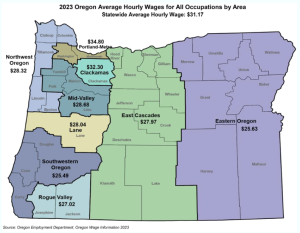Employment
Douglas County’s Per Capita Personal Income Decreased in 2022
By Brian Rooney, Regional Economist, Douglas and Lane counties, Oregon Employment Department The U.S. Department of Commerce, Bureau of Economic Analysis recently released its 2022 estimates of personal income for substate areas (counties and townships). Personal income includes all forms of income including earnings by place of work, dividends, interest…
Read MoreEmployment in Jackson County’s Arts, Entertainment, and Recreation Industry
By Guy Tauer, Regional Economist, Coos, Curry, Jackson, and Josephine counties, Oregon Employment Department The arts, entertainment, and recreation sector includes a wide range of establishments that operate facilities or provide services to meet varied cultural, entertainment, and recreational interests of their patrons. This sector comprises establishments that are involved…
Read MoreWage and Job Growth Across Many Industries
By Molly Hendrickson, Employment Economist, Oregon Employment Department Oregon had 1.98 million people working in jobs covered by the state’s unemployment insurance system during the first quarter of 2023. This was an increase of 21,700, or 1.1%, from the same quarter of the previous year. They earned a total of…
Read MoreHealth Care Jobs Now and Into the Future
By Lynn Wallis, Workforce Analyst, Clackamas and Washington counties, Oregon Employment Department Many industries in the nation are seeing an upward trend in employment as the economic landscape strengthens. According to the Bureau of Labor Statistics, six out of the 10 fastest-growing industries in the nation from 2022 to 2032…
Read MoreOregon Launches New Online System for Unemployment Insurance Benefits
Frances Online will provide better online customer service for people filingunemployment insurance claims MARCH 6, 2024 (SALEM, ORE.) – The Oregon Employment Department (OED) launched abrand new, easy-to-use online system for Unemployment Insurance (UI) benefits this week. UIbenefits went live through Frances Online on Mon., March 4. “Frances Online is…
Read MoreOregon’s Nonfarm Payroll Employment Rises by 4,400 in February
By Gail Krumenauer, State Employment Economist In February, Oregon’s seasonally adjusted nonfarm payroll employment rose by 4,400 jobs,following a revised loss of 5,700 jobs in January. February’s gains were largest in professionaland business services (+1,000 jobs) and in health care and social assistance (+900 jobs).Five other major industries each expanded…
Read MoreAsante Health System has concluded a 3% workforce reduction
Citing unsustainable financial losses over the past two fiscal years, Asante Health System has concluded a 3% workforce reduction across its regional hospitals and clinics as of Friday. This decision impacts more than 6,000 employees across Medford, Grants Pass, and Ashland. The memo to employees also mentions that other expense reductions have occurred without specifying details. Asante provides medical care for approximately 600,000 people in…
Read MoreDutch Bros moving 40% of corporate jobs out of Grants Pass
Dutch Bros to move 40% of corporate jobs out of Grants Pass and send them to the new corporate headquarters in Phoenix, Arizona by January 1,2025. Years ago we worked hard to get the internet infrastructure here so that innovative companies like Musicians Friend and Motorcycle USA as well as…
Read MoreSix Years After OregonSaves Launch, Workers Have Saved More than $200 Million for Retirement
The Oregon Retirement Savings Board and State Treasurer Tobias Read today announced that OregonSaves, the state’s auto-enrollment retirement savings program, has reached a significant milestone—$200 million saved for retirement. The occasion coincides with the rollout of the program to Oregon’s smallest businesses. Launched in July 2017, OregonSaves became the nation’s first state-based effort to address the retirement savings…
Read MoreA Snapshot of Oregon Firms by Size Class, 2023
In the first quarter of 2023, Oregon had nearly 165,000 private firms that were subject to paying unemployment insurance taxes. About 114,500 of these firms had at least one payroll employee in March. More than 19 out of 20 firms (or 96%) with workers on their payrolls had less than…
Read MoreOregon’s Nonprofits in 2022
A not-for-profit corporation, commonly referred to as a “nonprofit,” is organized to achieve a purpose other than to generate a profit. These entities qualify for federal tax exempt status and must reinvest any surplus revenues into efforts that further the mission of the organization. They are prohibited from passing profits…
Read More2023 Oregon Wage Information
Understanding how your take home pay compares with others in your field, or someone in a different career, is vitally important. It can inform you about how your work is being valued, and whether you may want to pursue more lucrative career options in the future. Likewise, hiring employers benefit…
Read More

